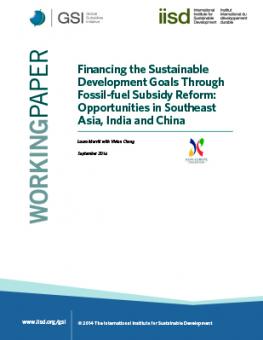
Financing the Sustainable Development Goals Through Fossil-fuel Subsidy Reform: Opportunities in Southeast Asia, India and China
This report from the Global Subsidies Initiative of IISD was launched in conjunction with the Asia Europe Foundation, at a conference exploring the financing of future Sustainable Development Goals (September 29–30, 2014).
The report finds that fossil-fuel subsidy removal and the subsequent taxation of fossil fuels via carbon taxes and VAT could provide significant fiscal resources to Asian governments in order to support the implementation of Sustainable Development Goals (SDGs) via a “Means of Implementation.” The report estimates that in Emerging and Developing Asia fossil-fuel subsidies account for US$104 billion annually, or close to the OECD’s total aid to the developing world. The report analyzes three areas: the potential savings from fossil-fuel subsidies to fund other more productive and targeted government spending, the impact from the persistence of fossil-fuel subsidies on wider proposed Sustainable Development Goals and case studies from the Philippines and Indonesia where governments have reformed fossil-fuel subsidies and been able to channel part of the savings towards social spending and investment in infrastructure. The reports includes a framework for revealing the links between fossil-fuel subsidies, their reform and opportunities for the financing and delivery of the SDGs. It is released as a working paper produced from the GSI with support from the Asia Europe Foundation and core funders. Comments to the author on the paper are welcomed.
You might also be interested in
The Indonesia Cooking Diaries Study
This study evaluates the feasibility and implications of switching from cooking with LPG to induction stoves in Indonesian households.
Rethinking Investment Treaties
International investment treaties and their investor–state dispute settlement (ISDS) system are facing growing scrutiny. But what would an alternative system—one fit for the challenges of the 21st century—look like?
India Faces Clean Energy Challenges as Energy Demand Soars and Global Fossil Fuel Subsidies Rise
New research finds the global energy crisis and increasing energy demand have pushed India's energy subsidies to a 9-year high.
Lithium-Sourcing Roadmap for India
This report aims to provide a strategy to guide policy-makers in sourcing lithium responsibly to promote clean energy manufacturing in India, with the broader aim of supporting low-carbon economic growth, creating equitable jobs, and helping to mitigate climate change impacts.